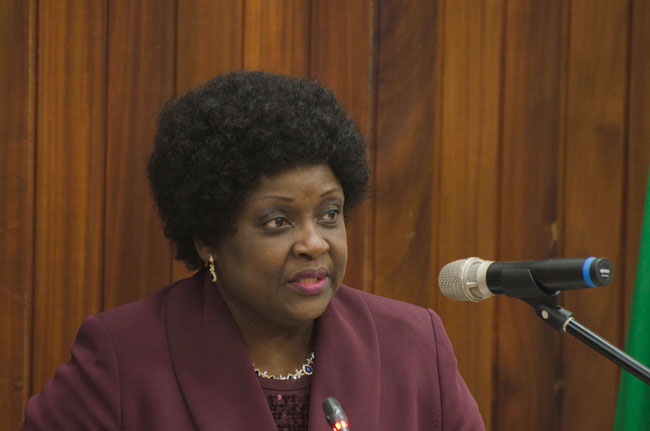On 30 May 2017, the annual Helen Kanzira Memorial Lecture was held for the first time in Maputo, Mozambique where the First Lady of Mozambique, Dr Isuara Nyusi, delivered the keynote address. The memorial lecture was organised by the Centre for Human Rights, University of Pretoria in collaboration with Centro de Direitos Humanos, Faculdade de Deireito, Universidade Eduardo Mondlane. The Universidade Eduardo Mondlane is one of 13 partner universities that present the LLM/MPhil in Human Rights and Democratisation in Africa (HRDA) programme.
![]() Download this press statement
Download this press statement![]() Download Dr Isuara Nyusi's address
Download Dr Isuara Nyusi's address
The annual Helen Kanzira Memorial Lecture is a call to remember the individual and collective value of every woman and the continued challenges faced in the access to reproductive health rights in Africa. Helen was a student on the HRDA programme in the year 2000 and tragically passed due to childbirth complications in 2007. This lecture further aims to raise awareness on and contribute to discourse around sexual and reproductive rights with a specific focus on maternal health rights, which arguably not only a point of concern in Africa but across the world where approximately 830 women die daily from complications arising from child birth.
The topic for this year’s lecture was ‘Sexual and Reproductive Rights of Women and Girls: Maternal Health Rights in Mozambique’.
Dr Isuara Nyusi noted that Mozambique has made important steps in order to promote and protect sexual and reproductive rights. The political will and environment are very strong on issues of sexual and reproductive rights combined with the state’s ratification of international, regional and national legal instruments on sexual and reproductive rights. Further, available data shows that the maternal mortality rate is decreasing every year, as well as the number of early marriages.
However, Dr Nyusi noted that although there is progress as mentioned above, Mozambique remains one of the countries with an unacceptably high level of early marriage and child and maternal mortality: Mozambique has the second highest rate of early marriages in the Southern African region. She also noted that only around 23% of pregnant women delivery their babies within the formal health system.
A panel discussion consisting of Dr Maira Domingas, representing civil society, Dr Pascoa Zualo Wate, representing the Ministry of Health, and Dr Luis Bitone Nahe representing academia, followed where panelists shared their experiences and ideas regarding sexual and reproductive health rights in Mozambique.
The panel discussion aimed at the following findings:
- There is limited access to sexual and reproductive health information and education programmes relating to sexual and reproductive rights for girls and adolescents. Further sexual and reproductive health services are not available in all health units especially in the rural areas of Mozambique. The legislation and policies on sexual and reproductive rights remain contradictory and are not full harmonised.
- The age of marriage should be harmonised, bearing in mind the international standards, namely, the Maputo Protocol and African Charter. Some cultural, traditional and religious norms remain barriers to the full implementation of sexual and reproductive rights in Mozambique.
- Harmful traditional practices affect women and children and, according to international and regional standards, should be eliminated. The new Penal Code should incorporated punishment on issues of the violation of sexual and reproductive rights and harmful traditional practices.
In conclusion, Prof Frans Viljoen, representing the Centre for Human Rights, University of Pretoria, emphasised the need for such dialogues where the public, policy makers and civil society come together to discus the issues surrounding sexual and reproductive health rights. Prof Viljoen thanked the organisers for executing a successful event and the First Lady of Mozambique, Dr Isuara Nyusi for taking delivering the keynote address.


